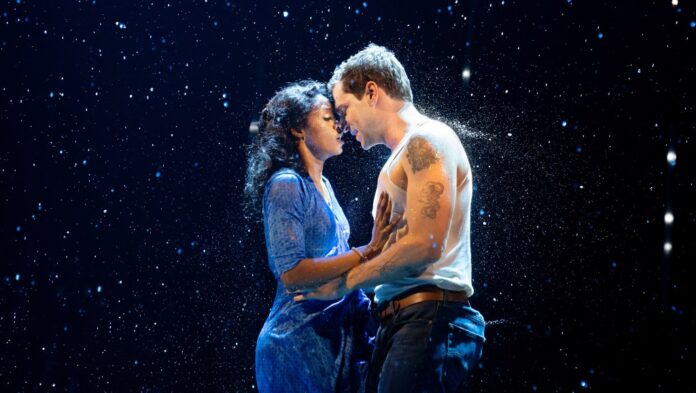The 2004 movie “The Notebook,” which starred Ryan Gosling and Rachel McAdams and tells the story of a fraught romantic relationship from optimistic youth to poignant old age, was dismissed by movie critics as various shades of sentimental pap. Audiences, who typically find greater value in the simple, human longing of ordinary folks, could not have disagreed more vehemently. The film, based on a Nicholas Sparks novel, developed a cult following and, over the next 20 years, turned many an inadequate Kleenex into pulp.
Now comes Broadway and the advent of “The Notebook: The Musical,” returning Allie and Noah — she with the snooty, dismissive parents, far meaner than the ones in “Dirty Dancing,” he with the soft hands and warm smile and the bad-boy gestalt — to the zeitgeist. The show, which opened Thursday night after a hit run at Chicago Shakespeare Theater, surely aims for that golden Broadway demographic trail traveled by “Mean Girls” and others: the enthusiastic presence of those who fondly remember the movie, only this time in concert with girlfriends, initially reluctant dates or spouses, or (jackpot!) daughters.
To the great credit of everyone involved here, “The Notebook” also delivers unexpectedly sophisticated theatricality with the requisite supercharging of the tear ducts, notwithstanding an archly familiar narrative.
There are two main reasons why this show works. Most important is the songwriter Ingrid Michaelson, who might be a Broadway newcomer but whose lyrics eschew mawkish pitfalls in favor of simple, direct communication of intense but familiar emotions through melody and song. It’s never easy to define freshness in songwriting, but it feels as if Michaelson just decided to watch the movie, or read the 1996 novel, and then write music about the way each stage of this central couple’s journey makes her feel. It’s unstuffy and unpretentious, which is good. But most crucially, Michaelson does not condescend.
Take this lyric as one example. The young Noah, dreaming of building a rural house for Allie sings: “I’ll paint the shutters blue. I’ll wrap the porch around the whole entire house, so we can watch the sunset, and the sunrise too. Who needs sleep when it’s me, that house and you?”
Allie gets one like that, too, as her about-to-married-to-the-wrong-guy self visits the old flame she still loves. “Is someone living with you? Is someone sleeping and waking beside you? And is someone loving you and are you are loving them, loving them, loving them too, in the night, in a room, in the house, in our home?”
See what I mean? The whole score is like that: characters sing what regular people feel in those circumstances. And while Michaelson’s music is more folk-roots-bluegrass-country than traditional Broadway, it’s what this material needed. You never feel like Allie and Noah are from Brooklyn.
The other reason? The director Michael Greif, who co-directs with Schele Williams. Years ago with “Rent,” astute observers noted, the dry-eyed Greif was the ideal foil for Jonathan Larson’s emotional wetness. So it goes here. If you’re familiar with the Greif oeuvre, you can see how he cuts away the treacle, focused on how life does not end as well as it starts (for most of us), and how he and his co-director figured out that the antagonist here is time. That’s what kills every lasting love affair. Mistakes and third parties are benign by comparison.
Bekah Brunstetter’s effective book uses young, middle and older versions of Allie and Noah, beginning with Jordan Tyson and John Cardoza, moving through Ryan Vasquez and Joy Woods and culminating in beautiful performances from Dorian Harewood and Maryann Plunkett, as set in a retirement home. The senior couple truly are moving, but then so are the actors playing their youngest selves. In the more formulaic middle stretch, Vasquez sings out Michaelson’s music the best of all, even if the connection between him and Woods is not all one might hope. The show uses a mix of white and Black actors, ignoring race until it wants to make a point. It’s a rare approach these days and its presence here is heartening to me.

Towards the end of the night, after taking advantage of Katie Spelman’s choreography, as built in Chicago, and the simple setting from David Zinn and Brett J. Banakis, Greif and Williams unexpectedly reveal the presence of the orchestra.
It’s calculating, I suppose. But the trick serves to intensify the emotion of the piece by reminding everyone present that, yes, we’re at a musical and that music has been a constant in how we’ve interpreted two lives, always comparing them to our own. It all sounds hokey and, yes, “The Notebook” is still “The Notebook” to some degree, but if you’re not thrilled and teary as the strings come in, I can’t imagine being your friend.
At the Gerald Schoenfeld Theatre, 236 W 45th St., New York; notebookmusical.com
Chris Jones is a Tribune critic.



